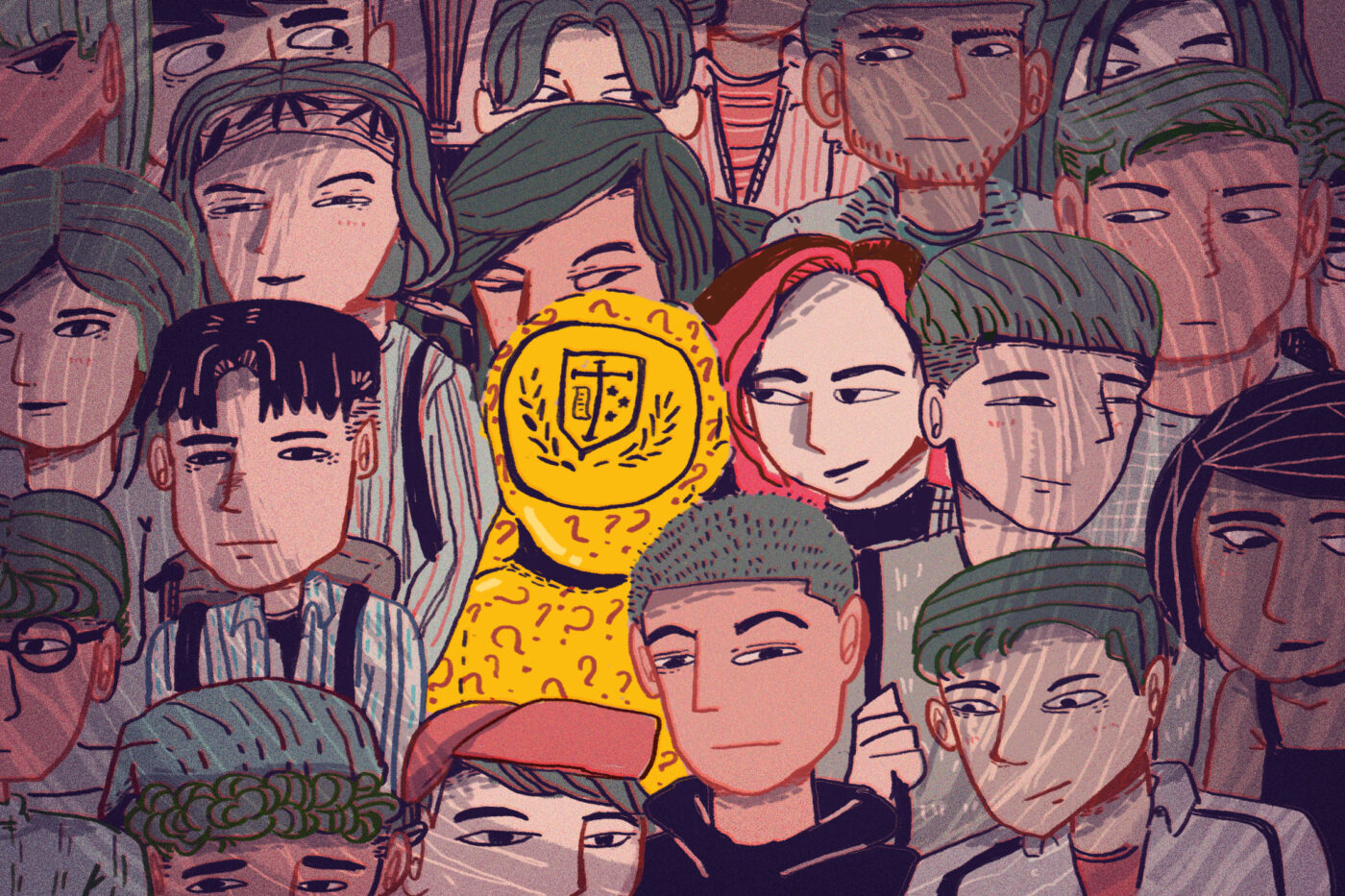Article III, Section 3, of the 2016 Constitution of the Undergraduate Students of Ateneo de Manila states: “The Sanggunian is the sole autonomous government of the Loyola Schools Student Body and all of its powers emanate from and belong ultimately to the said body.”
However, as an institution whose powers are vested in the student body, it has failed to capture their attention and support in recent years. Consider the recent general elections. The dismal 19.81% voter turnout is emblematic of the indifference towards the Sanggunian, its activities, and university politics in general.
Atom Perlada, a Legal Management senior, says that the Sanggunian “[feels] like a ghost figure,” and is never actively felt until elections or class suspensions. Other than these, it only comes as an “afterthought.”
Interdisciplinary studies senior Martina Chua* says that the Sanggunian is a “great concept,” but is “weak” in its execution.
The formal elements of the Sanggunian were brought to the present-day by the constitution; it’s time the Sanggunian follow suit through deliberate efforts to resolve internal issues and mend their broken ties with the student body.
To the fore
Since the establishment of the political parties, both IgnITE and USAD have been actively participating in the school’s political theatre. The two parties are guided by the principles of Liberal Democracy and Social Democracy, respectively. These political ideologies shape the parties’ position on issues involving the University.
A key point of contention is sectoral representation. According to USAD Premier Lanz Espacio, the Sanggunian’s primary role is to represent the various sectors within the student body—something that recent administrations have neglected.
“I think the problem with our student government is precisely that culture: That informal institution that sees the Sanggunian as irrelevant, does nothing but student services. For us to engage in sectoral representation builds this culture that we’re beyond… student services,” he says.
Espacio notes that focusing on student services rather than representation makes the Sanggunian “no different” than any other Council of Organizations of the Ateneo (COA) organization.
IgnITE standard bearer and Sanggunian Vice President Koko Quilatan agrees that initiatives such as freshmen batch shirts are not what the students want from their government. He promises that there will be less projects that are “trying to be relevant,” and more projects that “the students really have an active stake in.”
Newly elected President Carmela Vinzon, who is not affiliated with either party, says that the immediate plan of the Sanggunian is to answer all “urgent” concerns, one of which is giving official student representatives to the administrative offices.
While the two agree on the need for student representation in the Sanggunian, Espacio and Quilatan—and their respective parties—differ on emphasis.
USAD’s stance is primarily geared towards sectoral representation. Aside from block and course representatives, Espacio believes that sectors such as LGBT and Muslim students deserve representation in the student government.
On the other hand, Quilatan believes that the student body should have representatives in University-wide and administrative processes such as the curriculum review and the shuttle system. He looks forward to involving the student body more in these processes.
Seeking full disclosure
Policy direction is not the only problem that enlivens Ateneo political culture.
Early this school year, the integrity of the university’s political institutions was put into question over issues such as the transparency of the Student Judicial Council (SJC), the budget allocation policy of the transition government (TransGov), and IgnITE’s decision to hold donations for the Lakbayan Lumads.
The Ateneo Student Judicial Council was criticized by both USAD and IgnITE concerning its lack of transparency, particularly the overdue release of court documents integral to the 2016 Sanggunian General Elections.
Espacio called the silence of the court a “smearing” of the electoral proceedings and that their ambiguity “puts in jeopardy” the election. IgnITE president Ele Gealogo also criticized both the SJC and the Commission on Elections (COMELEC), saying they “failed” in being transparent and pondered whether documents were finished on time.
In response to these criticisms, the members of the court publicly called for the resignation of then-chief magistrate Jiggy Jacinto, writing in a Facebook post that “under his leadership, the court has failed to uphold the values of transparency and accountability.”
Despite these allegations, as of press time, both the SJC and COMELEC have not released an update on the electoral code for sectoral representation, which serves as one of the highlights of the new 2016 Constitution.
On the defensive
In cases of inter-party conflict, some prefer to communicate through formal memoranda while others voice out their concerns on social media. On August 24, USAD formally rejected TransGov’s proposal to fund political parties through a formal memorandum sent to Finance chairperson Hya Bendana. However, TransGov interpreted the memo as USAD’s rejection of their funding as a party—not the funding of political parties in general. Consequently, USAD was not involved in succeeding discussions and other candidates were able to receive a subsidy to finance their campaigns.
Many were shocked when Vinzon revealed during the election debates that TransGov has been funding political parties. Espacio points out that the absence of an official resolution and their failure to inform the public showed a “showed a lack of formality, transparency, and professionalism.”
That same night, members of both parties took to social media to air out their concerns. Gealogo defended the policy on a Facebook post, stating that the legalities were clarified and approved and that USAD did not use its members within TransGov to “participate and inquire” in the discussions.
USAD’s alleged lack of participation in the student government and their tendency to publicly complain after the fact is an old sentiment. Commenting on Gealogo’s post, former Sanggunian Finance Officer Ray Gomez (BS ME ‘16) said that “that’s always been the [USAD] style. Once nothing can be done anymore, that’s when you guys come out of the woodwork… and pretend to be the intelligent but marginalized heroes.”
Espacio finds no merit in these accusations. “I completely reject that notion that we as a party aren’t legitimate enough to criticize the Sanggunian on the basis of participation. If this is the case, then by extension, everyone else shouldn’t criticize the transition government of the Sanggunian,” he says.
Coming from a minority party, Espacio stresses that USAD can only do so much to influence the policy-making in the student government. It is important for the party to be vocal so that issues that the majority may overlook are not ignored. While they may not be the majority party, as a political entity composed of constituents of the university, they certainly have the right and responsibility to lobby for their agenda.
Igniting dissonance
The majority party, IgnITE has also faced its share of turmoil. Last October, the party was criticized for soliciting donations for Lakbayan, a movement with ties to the CPP-NPA-NDF, a militant left organization known for exploiting indigenous peoples.
Benjamin Alvero, 3 AB Political Science Course Representative-elect and a member of USAD, said “These organizations have displayed an instrumentalist… approach to indigenous peoples in pursuit of their own agendas.” The statement was later retracted as it was called “out of line” by the USAD Premier.
On an ideological level, it was confusing for IgnITE to associate itself with Lakbayan despite the latter’s links to these militant groups. While the former is a “liberal democratic” party of the Ateneo, the CPP-NPA-NDF is a national democratic group that waged armed conflict with the government and has since engaged in terrorist acts in the name of communism since the Marcos era.
Furthermore, as a political entity, IgnITE’s every action is scrutinized and held to a standard different from that of a private person as its actions will always bear political implications.
However, Quilatan clarified that the donation drive was not meant to endorse Lakbayan nor its organizations. Although he admits that they are tied to such leftist groups and they came in Manila with “questionable circumstances,” he appeals for the separation of ideology and humanitarian actions.
He clarifies that IgnITE is not supporting Lakbayan “on an official capacity because of the contentiousness of the politics involved.”
Engaging the constituency
While the Constitutional Convention marked the beginning of a new Sanggunian and the end of its quota woes, the student government still has a long way to go before they could hope to reach out to a larger majority of the student body.
It is clear that IgnITE and USAD wish to be identified with their respective strands of democracy, as they have emphasized them even after rebranding themselves. However, they must also strive to be more comprehensible to the student body, especially those who are not as politically inclined or interested as those in government.
Political ideologies like liberal democracy and social democracy were products of complex historical situations that were responses to the needs of a specific people. The parties must nuance these ideals in light of their role in student government, so that their initiatives are inclusive and relevant. Like any other political party, IgnITE and USAD are both more and less than their ideological leanings, which are ultimately geared towards the betterment of the student body.
If the Sanggunian does not wish to be defined by infighting, they must shift the arena of their debate outside of the abstract and express their differences in tangible policies and actions.
*The interviewee has been given an alias to maintain anonymity.







